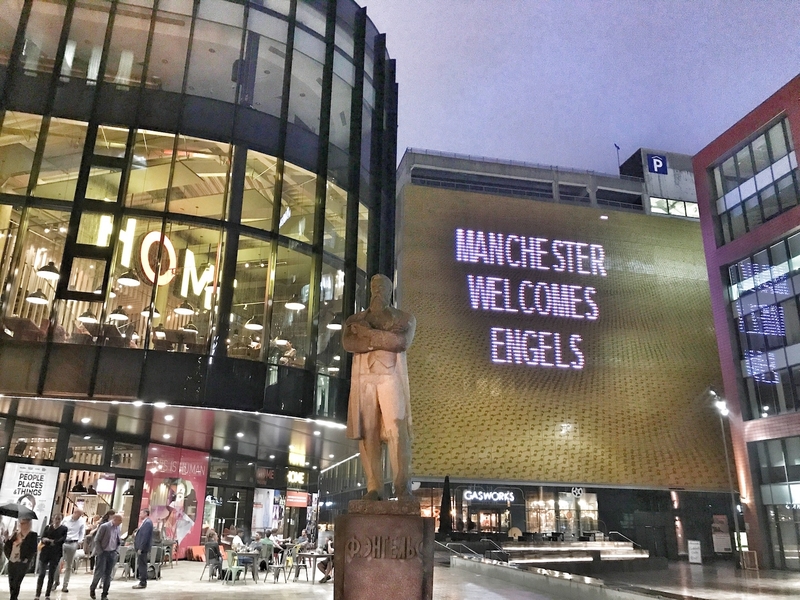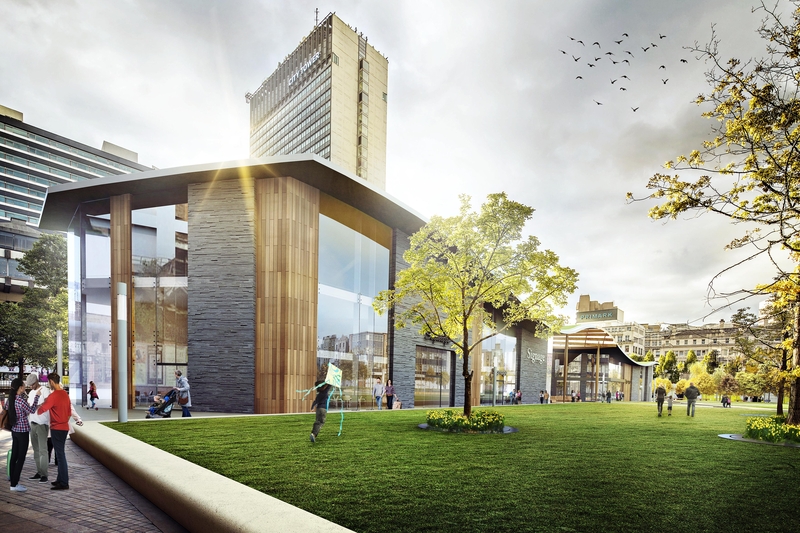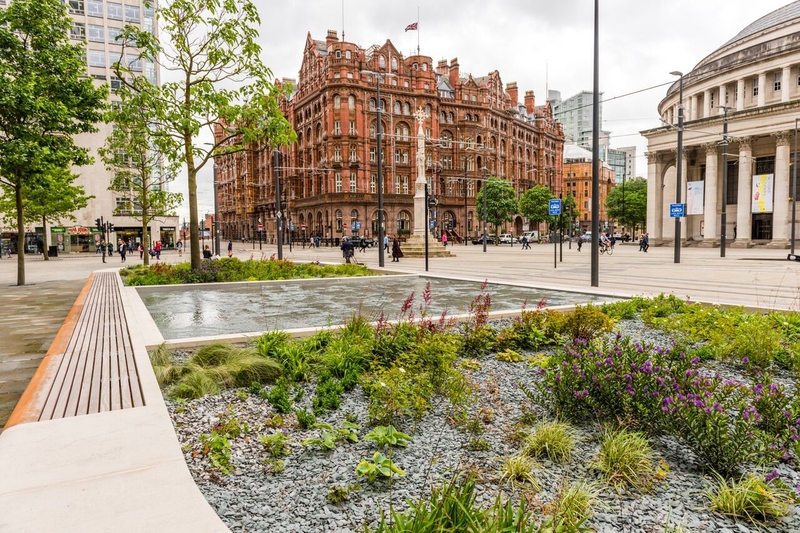Jonathan Schofield asks: are we selling off the family silver
PART ONE: The problem with privately owned public spaces (POPS)
You can't escape this one if you start talking about Manchester’s development. It’s Top of the POPs when it comes to land use rows, with, in this case, the ‘pops’ being an acronym meaning 'privately owned public spaces'.
Manchester and Salford’s rush to build has created a number of areas that smell public and look public but aren’t. They might feature bars with terraces, lots of benches and occasional green spaces for little ‘uns to run in, but they are privately owned. They also, on occasion, feature security firms all walkie-talkied up and wearing shouty hi-vis.
Out in the very attractive landscaping and ‘piazza’ at MediaCityUK, Peel have guards skidding about on Segways, like enforcers from some seventies sci-fi movie, perhaps Logan’s Run. It looks good fun. Logan’s Run is set in 2224 and everybody over 30 gets ‘recycled’, the world is only for the young and beautiful, for those who ‘fit-in’.
Some critics feel this is what is happening with POPS in 2018. You’ll never see a beggar sat down for long before they are moved on. Bike and scooter riding might also be banned; even something as harmless as taking a picture with a ‘professional-looking camera’ can be challenged. It goes without saying that in private spaces public protest is not allowed without prior permission.
It’s a sort of creeping privatisation which happened without people really noticing it
George Parker in The Financial Times has written: ‘Some believe that urban design in Western cities is being used to stifle protest and the right of free citizens to gather peacefully in public spaces to express dissent.’ Anna Minton is a leading commentator on the subject and has a book called Ground Control. She has said, ‘It’s a sort of creeping privatisation which happened without people really noticing it.’
On a recent tour around Mayfield, I was asked if the magnificent proposed 6.5 acre park, would be, and I quote: “one of these neo-liberal spaces that have their own sort of secret police telling you what to do and what not to do and where to go and not go. We’re losing all our public spaces.” It’s not a typical question during tours. It led to this article.
Regular commentator on Confidential, Dr Morag Rose, a Mancunian academic at Liverpool University, says: "I believe public space is a precious asset which we need to protect. It’s vital that Manchester has places that are uncommodified and open to everyone. Public space is where we encounter each other and find our place in the shared life of the city. There is a fundamental difference when we are permitted to be somewhere rather than have an actual right to be there.
“POPs may be perfectly lovely places but we must be clear they are not the same as a truly communal facility. We need to be mindful not just of erasure of space through building but of invisible barriers too. This can be an unwelcoming atmosphere, the sense you have to look a certain way or need to spend money or the absence of street furniture or public toilets.
“We need to question who the city is for and what we want it to be; the issue of access to, maintenance and protection of public space is at the very heart of this."
One of the cases Anna Minton has highlighted is how, some years ago, Occupy London, the anti-capitalist protest group, couldn’t find a public protest site in the POPSville that is the City of London.
PART TWO: How much public space has been lost and how many POPS have we gained?
So in Manchester in late 2018, are we losing genuine public space to POPS? And what are the owners of those POPS saying for themselves.
If we take the long view, twenty years, then there have been losses of public spaces to private development, but they have been tiny.
Part of Piccadilly Gardens was consumed by One Piccadilly to help pay for the redevelopment of the gardens prior to the 2002 Commonwealth Games. The public land was compensated for by the creation of a useless piece of terra firma crammed between tram tracks close to where Primark balefully squats.
As part of the redevelopment of Spinningfields, public spaces including Crown Square along the world’s dreariest and most misnamed ‘processional way’ were transferred to developer Allied London. It is now immeasurably more used and more attractive.
Meanwhile all the pre-existing publicly-owned areas still exist, for example St Peter’s Square (a renovated big win), Sackville Gardens, St John’s Gardens, Parsonage Gardens, St Ann’s Square, Albert Square, Lincoln Square, Stevenson Square, Angel Meadow and of course, poor, tragic, Piccadilly Gardens.
...there has been far more usable public space created in the last generation than POPS
As for new public spaces in the same time period, there have been several major contributions: Exchange Square, Cathedral Gardens, Cutting Room Square, Greengate Square, the on-going landscaping and improvements around the Cathedral, that odd square close to the Cat Cafe in the Northern Quarter.
Meanwhile, not so far from the city centre lies Hulme Park, which has been a huge success. Peel Park in Salford is now utterly delightful, while Salford also proposes a small Greengate Park closer to the city centre.
The bigger POPS include the various Spinningfields’ landscaped areas, Great Northern Square, Angel Square, Sadler’s Yard, Piccadilly Place (if this really counts), Cotton Field Park, and coming up, Circle Square’s gardens and those in Deansgate Square and Kampus. Mayfield Park, 6.5 acres (think the area of Piccadilly Gardens plus all the parts presently covered by the tram tracks on the south west and north east) will create a truly impressive POPS.
A little outside the city centre and just recently completed, is the landscaping of Brunswick Street, at the University. This provides an excellent and extensive area of green and hard surfaces. As university land it falls into the category of POPS rather than public ownership.
The balance sheet quite clearly shows there has been far more usable public space created in the last generation than POPS, that little has been lost, and that POPS have supplemented the public space often in places such as Sadler's Yard and Circle Square where there was previously no public access at all.

PART THREE: What the developers say about POPS in Manchester
So what do the private owners/developers of existing/proposed POPS say about the way they run or will run their open access spaces?
John Hughes, Managing Director of ASK, says of First Street and Tony Wilson Place. “We entered into a Deed of Access with the City Council to ensure First Street was always publicly accessible. My general view is that private ownership means better security and a cleaner no-litter environment versus public adopted spaces where austerity has directly impacted on the provision of cleaning and security, as per Confidential's recent article over police inaction”.
Hughes, in referring to an incident a couple of years ago when a photographer was challenged, said that was a mistake and: “We never had a policy of no photography on any part of the First Street estate.”
Chris Oglesby, Chief Executive of Bruntwood, says of the Circle Square (CS) development: “The city needs more high quality public space and, for the most part, in a world of local government restricted budgets, once delivered, whether in public or private ownership, I believe we need the private sector to fund an enhanced level of maintenance either directly or through other arrangements.
“We will approach it a bit differently at CS. I don't tend to be one for hard and fast rules, but rather aim to present a vision of the end goal and initially get people to apply discretion in achieving it. There will be no ‘rules’ that go beyond the laws of the land at CS. We will close off areas from time to time when we have events and the Medlock Park behind the Vita Student Block will close at night due to the lack of footfall.”
Private spaces do not mean ‘bad’ and public spaces do not mean ‘good’
None of the people we asked wanted a heavy handed security policy. Of course public protest or demonstration could only go ahead with prior permission, which is the case with most publicly owned land anyway.
Meanwhile, the fact that it is private land must be considered and of course, as would apply everywhere, the owners will have the final say. The fact that we have more public land now than twenty years ago, and that it still far outstrips in scale the POPS, means there is less evidence in Manchester for Minton’s ‘creeping privatisation’ than in London, certainly in terms of scale.
Another the developments insider makes a different point: “Private spaces do not mean ‘bad’ and public spaces do not mean ‘good’. In fact, it may be quite the reverse. Private investment in the creation of and then maintenance of city spaces is a necessity. At the same time we must be aware of the growing regulation of what can happen in public spaces. This again is quite the reverse of the conventional view that public means good and private means bad. In a city where having a beer and a fag in public is frowned upon, banned and probably uncomfortable for most of us, then maybe we should say roll on more private spaces.”
This is moot. Aside from maintenance, public spaces also are crammed with rules and regulations.

PART FOUR: Rules, regulations, politics and ‘just be considerate’
Several years ago I was stopped from taking a photograph in Piccadilly Gardens when part of it hosted a skating rink. Some security bods rushed over and made me feel like a pervert. I was taking a picture of kids on the rink. Thing was, they were my kids. The security bods told me to stop. I told them to bugger off. I took the picture. They looked like they were going to wrench the camera off me. They didn’t, but it was a classic case of misplaced authority.
In the public space that is All Saints Gardens, there is a sign that is a public park classic. It reads: ‘No Ball Games’. Spoilsports. Meanwhile you are not legally allowed to booze in public areas in Manchester unless there’s a terrace in a private bar overlooking the space. As for public toilets, there are none in central Manchester except on Lloyd Street next to Albert Square. At the same time, for mass protest in the public spaces of Manchester, permission must be gained (especially if there might be trouble).
One Twitter comment has been that skateboarders in, say, Cathedral Gardens are ‘an indication of how free a space might be regarded for groups that are not obviously consumers and therefore are often regarded as suspect in urban space’.
The problem is that skateboarders are a nuisance in a public space, their speed and erratic control worry parents with kids and the elderly in particular, whilst they also damage expensive street furniture. Considerate use of public and private space surely means that all sections of society should be able to enjoy them. Skateboarders should have their own space, not valuable public space, their presence make Cathedral Gardens probably less public.
In Manchester, it appears, the main restriction of use and commodification of public space comes from the City Council rather than POPS. Right now much of city centre public space has disappeared under fake Alpine cabins and will soon carry a fug of mulled wine. There’ll be security too.
Mostly it’s about liberal capitalism and a strident socialism squaring up to each other
Maybe the real question those who worry about the growth of POPS should ask, is 'how come so much genuinely public space is so frequently sold to the highest bidder?' Then again, what can cash strapped councils do when austerity bites (oh come on Theresa, it’s not over).
The main improvement all POPS and public spaces might make is to have a notice that clearly states what’s allowed and what’s not allowed and who to apply to if you wish for a licence to film or to plan a protest. In other words let’s have clarity. As Morag Rose says: “The problem is sometimes you don’t know what type of space you’re in; POPS shouldn’t pretend they are something they are not. Make it plain to us.”
What is certain is that as citizens we must fight tooth and nail to retain publicly owned public spaces in Manchester and Salford. There should be no retreat on this point of principle, no selling off and no selling out. If POPS give us more usable and accessible pleasant spaces in which to sit and walk, all well and good, but no established public spaces should be sacrificed to achieve this.
The noise over this issue is mainly about politics, of course. Mostly it’s about liberal capitalism and a strident socialism squaring up to each other. What might best be avoided on both sides is the extremes: overbearing nasty landowners on one side with their almost paramilitary guards applying hidden rules in their POPS, and anti-capitalist protesters on the other who are modern Diggers - those seventeenth century radicals and proto-anarchists who believed there should be no private ownership of land.
Let’s give the last word to James May, the development director of U+I at Mayfield. He wants to apply common sense rules to running the largest of the POPS the city will gain, Mayfield Park.
“Let’s face it, if we do our job right you will know where you can kick a football, or eat your lunch, or where the younger kids can play. You have to police these spaces but it should be clear what the rules are. Also, I would want our people to maybe dress like concierges, and act like them. Politely. I don’t want guards in bovver boots looking like a SWAT team sporting a security camera on their front. If you’re anti-social then you will have to leave but that’s the same in a public park. The main rule should be simple, just be considerate of others.”

You might also like: Lawless Manchester: have the police really given up?
Pictured top: Friedrich Engels statue in First Street















